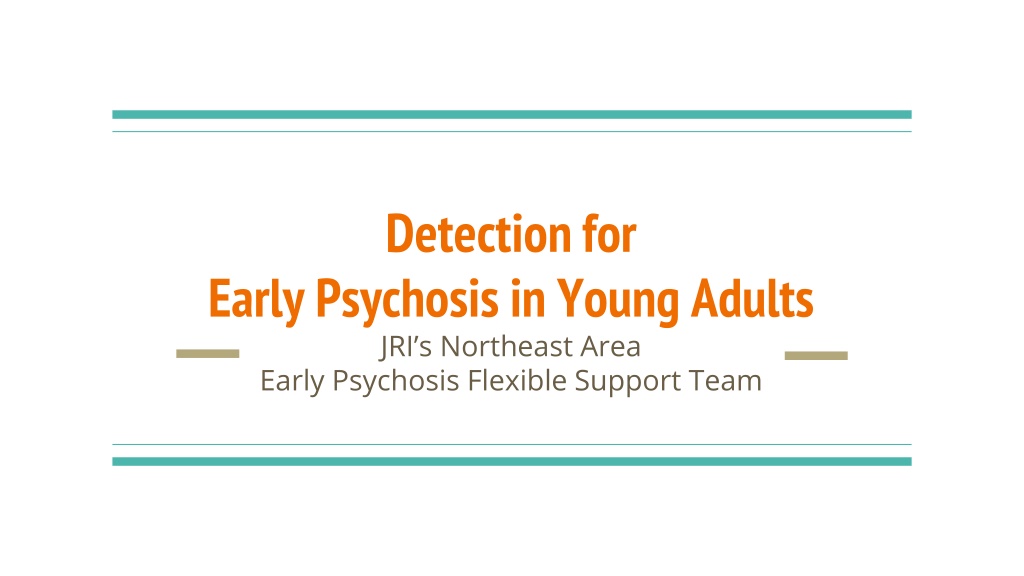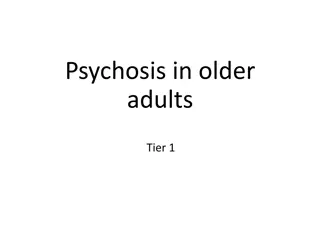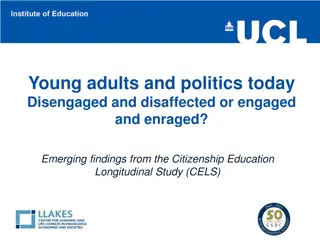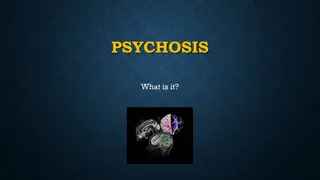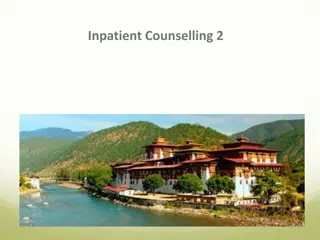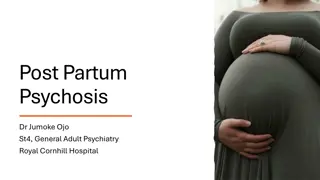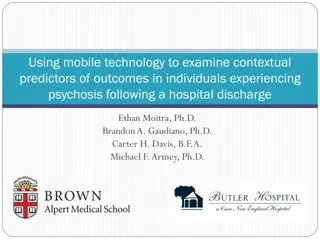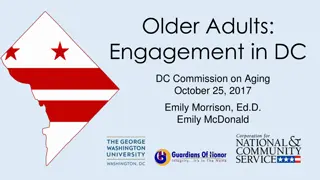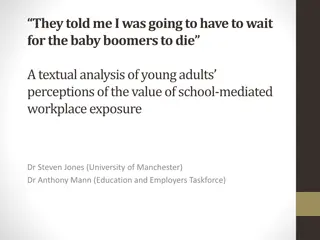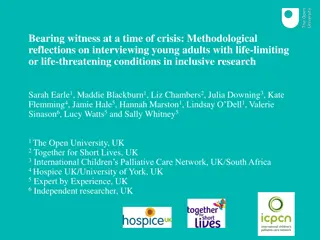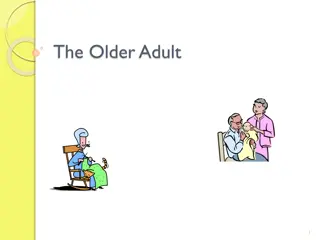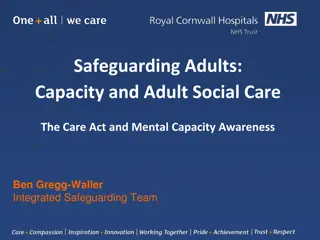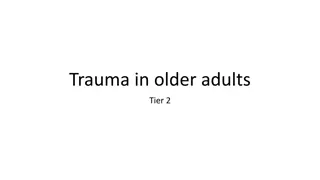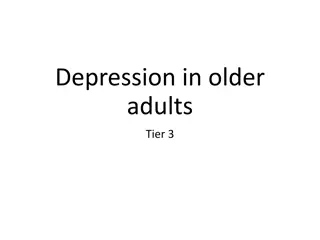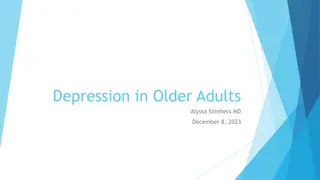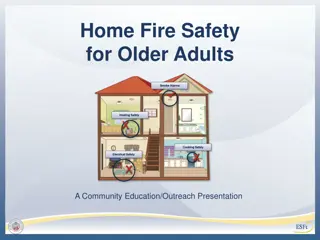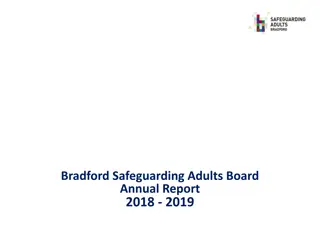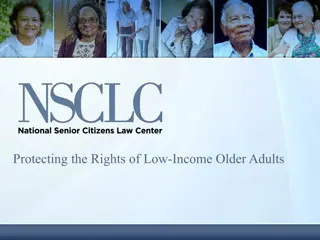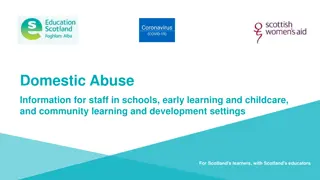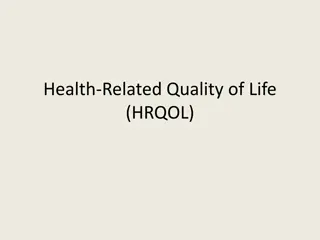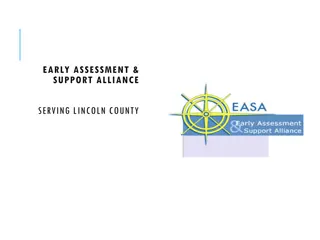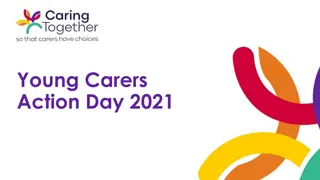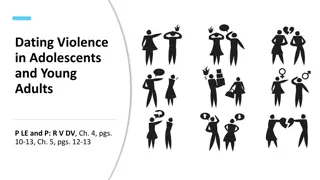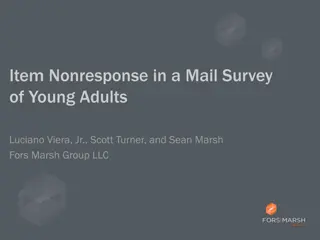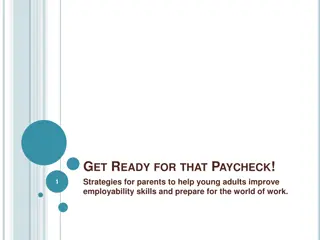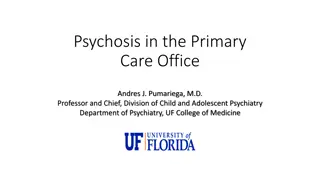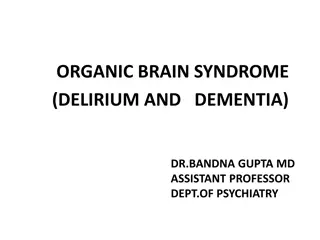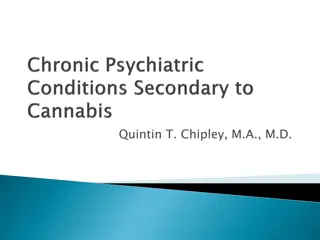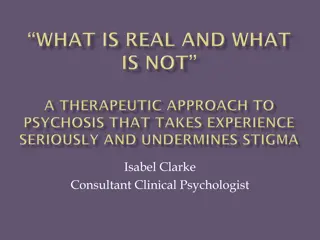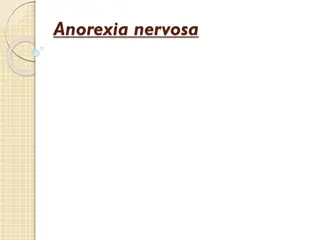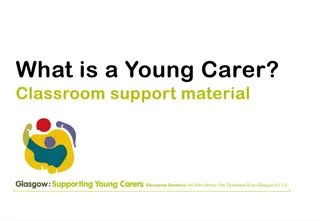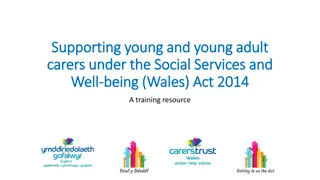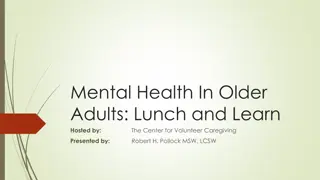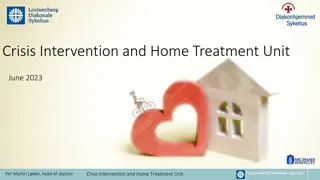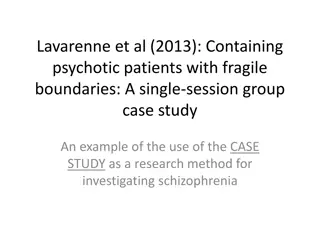Understanding Psychosis in Young Adults
Psychosis is a mental health condition that can affect young adults and involves a loss of contact with reality. Early detection is crucial for effective treatment. Young adults experiencing psychosis may face obstacles to getting appropriate care, such as social stigma, lack of awareness, and transportation issues. Recognizing symptoms like hallucinations, delusions, and cognitive difficulties is essential. Support services like the Peace Partners program and specialized care teams can provide vital assistance in managing psychosis.
Download Presentation

Please find below an Image/Link to download the presentation.
The content on the website is provided AS IS for your information and personal use only. It may not be sold, licensed, or shared on other websites without obtaining consent from the author. Download presentation by click this link. If you encounter any issues during the download, it is possible that the publisher has removed the file from their server.
E N D
Presentation Transcript
Detection for Early Psychosis in Young Adults JRI s Northeast Area Early Psychosis Flexible Support Team
CFFSS SPECIALTY TEAMS Children s Friend and Family Services is a Division of Justice Resource Institute (JRI) Locations: Lynn, Lawrence, Salem, Gloucester, and Lowell Services: Outpatient In-home Family Therapy (IHT) Therapeutic Mentoring (T.M) CSA (Lynn & Lawrence) Early Psychosis Specialty Care (DMH Flexible Support Contract) NEW Drop-in Center in Gloucester
WHAT IS PSYCHOSIS? Most likely to begin in young adulthood Conditions which affect the mind and where there appears to have some loss of contact with reality. Like other illnesses it can be treated Can be the presence or absence of something (known as + or - symptoms) Around 3 out of every 100 people will experience a psychotic episode.
Access to Appropriate Treatment What does it look like for a youth with early signs of psychosis? Obstacles to treatment: Transportation Desire to Receive Care Lack of Culturally-Competent Care Resources to Learn More Social stigma and limited mental health awareness
PEACE P - PARTNERS E - EMPOWERING A - ADOLESCENT C - COMMUNITY E - EXPERIENCES
Stress Vulnerability Model Biological Vulnerability Symptoms Stress
Symptoms of Psychosis Symptom Description Example Hallucinations Hearing, seeing, feeling, or smelling things that others do not experience Hearing voices others cannot hear or seeing things that others do not see. Delusions (having false beliefs) Having a firm belief that is strongly held in spite of contrary evidence Feeling convinced that ways cars are parked outside of house indicate person is being watched by police. Confused thinking & other cognitive difficulties Difficulty thinking and expressing oneself clearly; Problems with concentration, memory, and reasoning Sentences are unclear or don t make sense. Thoughts seem to speed up or slow down, easily distractable.
Symptoms of Psychosis (cont.) Symptom Description Example Decline in Social Functioning Less time socializing, problems at school or work; isolation Difficulty making friends or spending time w/friends & family; spending a lot of time alone in one s room. Disorganized Behavior Unpredictable movements or remaining motionless for extended periods. Standing looking at the sun for hours; staying in a stuck position. Negative Symptoms Lack of energy, motivation, pleasure, or emotional expressiveness. Things that you used to enjoy don t bring the same pleasure; difficulty getting going
STAGES OF PSYCHOSIS Phase 1: Prodrome The early signs are vague and hardly noticeable. There may be changes in the way some people describe their feelings, thoughts and perceptions. Phase 2: Acute Clear psychotic symptoms are experienced, such as hallucinations, delusions or confused thinking. Phase 3: Recovery Psychosis is treatable and most symptoms improve. The pattern of recovery varies from person to person.
(+) and (-) Symptoms Positive Symptoms: Unusual perceptions Odd beliefs Hallucinations Feeling of uneasiness around others Paranoia Ideas of reference or grandiosity Negative Symptoms Sudden loss of social connection Marked withdrawal Catatonia
Treatment Provider Aims Medication Management Psychiatrist, Nurse Clinician, Prescriber Monitor use of medication to reduce symptoms Family Education Program (FEP) Intensive Family Therapy Clinician Provide information and skills to help relatives support their family member s involvement in treatment and to move forward in recovery Individual Resiliency Training (IRT) IRT Clinician/Outpatient Work collaboratively to make progress towards goals and improve functioning Family Partner Trained family partner with lived experience Shares lived experience of parenting a child with psychosis and mental health challenges Peer Mentor Trained mental health professional with lived experience Shared lived personal experiences with psychosis to provide emotional support
Peer Support Specialist Personal Life experience with a Mental health condition And is further along in their treatment Journey. Use of personal life experiences to help others cope with similar mental health Conditions I have been there my self Support in Identifying areas the youth would need more support Emotional support Identifying Strengths. Problem solve Feedback
Referral Process: PEACE TEAM 1. DMH application 2. Determine appropriate treatment 3. Criteria a. Must be under 22 years of age b. Experienced a first episode of psychosis or is at risk of developing early psychosis c. No insurance required for P.E.A.C.E d. If insurance accepted by CFFS, outpx with focus on psychosis is another option (no DMH needed)
Referral Process: FEP TEAM 1. Submit an outpatient therapy referral form a. Check off Salem office for all referrals b. Fax to number on form or email Christin Brown (cbrown2@jri.org) 2. Team will determine appropriate treatment 3. Criteria a. Experienced a first episode of psychosis within 3 years of referral b. Has JRI-accepted insurances (Blue Cross Blue Shield, Masshealth, Optum, Allways, Harvard Pilgrim)
